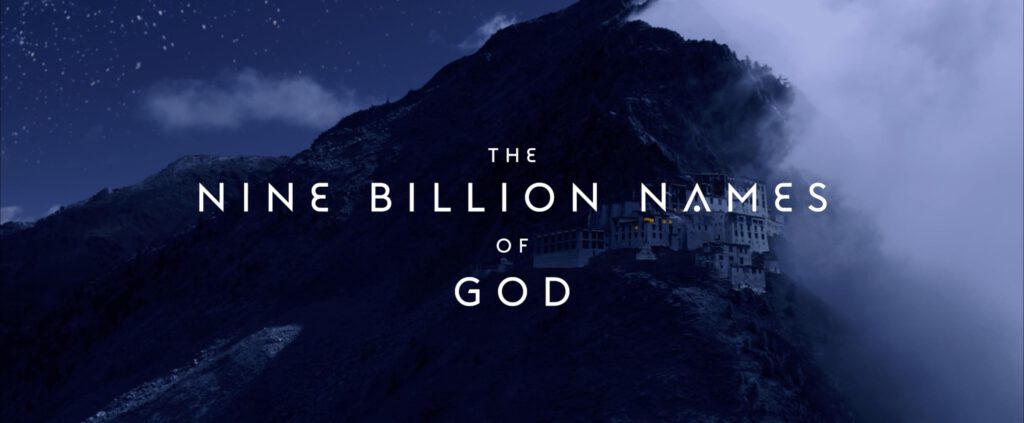 “This is a slightly unusual request,” said Dr. Wagner, with what he hoped was commendable restraint. “As far as I know, it’s the first time anyone’s been asked to supply a Tibetan monastery with an Automatic Sequence Computer. I don’t wish to be inquisitive, but I should hardly have thought that your — ah — establishment had much use for such a machine. Could you explain just what you intend to do with it?”
“This is a slightly unusual request,” said Dr. Wagner, with what he hoped was commendable restraint. “As far as I know, it’s the first time anyone’s been asked to supply a Tibetan monastery with an Automatic Sequence Computer. I don’t wish to be inquisitive, but I should hardly have thought that your — ah — establishment had much use for such a machine. Could you explain just what you intend to do with it?”
“Gladly,” replied the lama, readjusting his silk robes and carefully putting away the slide rule he had been using for currency conversions. “Your Mark V Computer can carry out any routine mathematical operation involving up to ten digits. However, for our work we are interested in letters, not numbers. As we wish you to modify the output circuits, the machine will be printing words, not columns of figures.”
“I don’t quite understand….”
“This is a project on which we have been working for the last three centuries — since the lamasery was founded, in fact. It is somewhat alien to your way of thought, so I hope you will listen with an open mind while I explain it.”
“Naturally.”
“It is really quite simple. We have been compiling a list which shall contain all the possible names of God.”
“I beg your pardon?”
“We have reason to believe,” continued the lama imperturbably, “that all such names can be written with not more than nine letters in an alphabet we have devised.”
“And you have been doing this for three centuries?”
“Yes: we expected it would take us about fifteen thousand years to complete the task.”
“Oh,” Dr. Wagner looked a little dazed. “Now I see why you wanted to hire one of our machines. But exactly what is the purpose of this project?”
The lama hesitated for a fraction of a second, and Wagner wondered if he had offended him. If so, there was no trace of annoyance in the reply.
“Call it ritual, if you like, but it’s a fundamental part of our belief. All the many names of the Supreme Being — God, Jehovah, Allah, and so on — they are only man-made labels. There is a philosophical problem of some difficulty here, which I do not propose to discuss, but somewhere among all the possible combinations of letters that can occur are what one may call the real names of God. By systematic permutation of letters, we have been trying to list them all.”
“I see. You’ve been starting at AAAAAAA… and working up to ZZZZZZZZ….”
“Exactly — though we use a special alphabet of our own. Modifying the electromatic typewriters to deal with this is, of course, trivial. A rather more interesting problem is that of devising suitable circuits to eliminate ridiculous combinations. For example, no letter must occur more than three times in succession.”
“Three? Surely you mean two.”
“Three is correct: I am afraid it would take too long to explain why, even if you understood our language.”
“I’m sure it would,” said Wagner hastily. “Go on.”
“Luckily, it will be a simple matter to adapt your Automatic Sequence Computer for this work, since once it has been programmed properly it will permute each letter in turn and print the result. What would have taken us fifteen thousand years it will be able to do in a hundred days.”
Dr. Wagner was scarcely conscious of the faint sounds from the Manhattan streets far below. He was in a different world, a world of natural, not man-made, mountains. High up in their remote aeries these monks had been patiently at work, generation after generation, compiling their lists of meaningless words. Was there any limit to the follies of mankind? Still, he must give no hint of his inner thoughts. The customer was always right….
“There’s no doubt,” replied the doctor, “that we can modify the Mark V to print lists of this nature. I’m much more worried about the problem of installation and maintenance. Getting out to Tibet, in these days, is not going to be easy.”
“We can arrange that. The components are small enough to travel by air — that is one reason why we chose your machine. If you can get them to India, we will provide transport from there.”
“And you want to hire two of our engineers?”
“Yes, for the three months that the project should occupy.”
“I’ve no doubt that Personnel can manage that.” Dr. Wagner scribbled a note on his desk pad. “There are just two other points —”
Before he could finish the sentence the lama had produced a small slip of paper.
“This is my certified credit balance at the Asiatic Bank.”
“Thank you. It appears to be — ah — adequate. The second matter is so trivial that I hesitate to mention it — but it’s surprising how often the obvious gets overlooked. What source of electrical energy have you?”
“A diesel generator providing fifty kilowatts at a hundred and ten volts. It was installed about five years ago and is quite reliable. It’s made life at the lamasery much more comfortable, but of course it was really installed to provide power for the motors driving the prayer wheels.”
“Of course,” echoed Dr. Wagner. “I should have thought of that.”
 The view from the parapet was vertiginous, but in time one gets used to anything. After three months, George Hanley was not impressed by the two-thousand-foot swoop into the abyss or the remote checkerboard of fields in the valley below. He was leaning against the wind-smoothed stones and staring morosely at the distant mountains whose names he had never bothered to discover.
The view from the parapet was vertiginous, but in time one gets used to anything. After three months, George Hanley was not impressed by the two-thousand-foot swoop into the abyss or the remote checkerboard of fields in the valley below. He was leaning against the wind-smoothed stones and staring morosely at the distant mountains whose names he had never bothered to discover.
This, thought George, was the craziest thing that had ever happened to him. “Project Shangri-La,” some wit back at the labs had christened it. For weeks now the Mark V had been churning out acres of sheets covered with gibberish. Patiently, inexorably, the computer had been rearranging letters in all their possible combinations, exhausting each class before going on to the next. As the sheets had emerged from the electromatic typewriters, the monks had carefully cut them up and pasted them into enormous books.
In another week, heaven be praised, they would have finished. Just what obscure calculations had convinced the monks that they needn’t bother to go on to words of ten, twenty, or a hundred letters, George didn’t know. One of his recurring nightmares was that there would be some change of plan, and that the high lama (whom they’d naturally called Sam Jaffe, though he didn’t look a bit like him) would suddenly announce that the project would be extended to approximately A.D. 2060. They were quite capable of it.
George heard the heavy wooden door slam in the wind as Chuck came out onto the parapet beside him. As usual, Chuck was smoking one of the cigars that made him so popular with the monks — who, it seemed, were quite willing to embrace all the minor and most of the major pleasures of life. That was one thing in their favor: they might be crazy, but they weren’t bluenoses. Those frequent trips they took down to the village, for instance…
“Listen, George,” said Chuck urgently. “I’ve learned something that means trouble.”
“What’s wrong? Isn’t the machine behaving?” That was the worst contingency George could imagine. It might delay his return, and nothing could be more horrible. The way he felt now, even the sight of a TV commercial would seem like manna from heaven. At least it would be some link with home.
“No — it’s nothing like that.” Chuck settled himself on the parapet, which was unusual because normally he was scared of the drop. “I’ve just found what all this is about.”
What d’ya mean? I thought we knew.”
“Sure — we know what the monks are trying to do. But we didn’t know why. It’s the craziest thing—”
“Tell me something new,” growled George.
“— but old Sam’s just come clean with me. You know the way he drops in every afternoon to watch the sheets roll out. Well, this time he seemed rather excited, or at least as near as he’ll ever get to it. When I told him that we were on the last cycle he asked me, in that cute English accent of his, if I’d ever wondered what they were trying to do. I said, ‘Sure’ — and he told me.”
“Go on: I’ll buy it.”
“Well, they believe that when they have listed all His names — and they reckon that there are about nine billion of them — God’s purpose will be achieved. The human race will have finished what it was created to do, and there won’t be any point in carrying on. Indeed, the very idea is something like blasphemy.”
“Then what do they expect us to do? Commit suicide?”
“There’s no need for that. When the list’s completed, God steps in and simply winds things up… bingo!”
“Oh, I get it. When we finish our job, it will be the end of the world.”
Chuck gave a nervous little laugh.
“That’s just what I said to Sam. And do you know what happened? He looked at me in a very queer way, like I’d been stupid in class, and said, ’It’s nothing as trivial as that.’ ”
George thought this over a moment.
“That’s what I call taking the Wide View,” he said presently. “But what d’you suppose we should do about it? I don’t see that it makes the slightest difference to us. After all, we already knew that they were crazy.”
“Yes — but don’t you see what may happen? When the list’s complete and the Last Trump doesn’t blow — or whatever it is they expect — we may get the blame. It’s our machine they’ve been using. I don’t like the situation one little bit.”
“I see,” said George slowly. “You’ve got a point there. But this sort of thing’s happened before, you know. When I was a kid down in Louisiana we had a crackpot preacher who once said the world was going to end next Sunday. Hundreds of people believed him — even sold their homes. Yet when nothing happened, they didn’t turn nasty, as you’d expect. They just decided that he’d made a mistake in his calculations and went right on believing. I guess some of them still do.”
“Well, this isn’t Louisiana, in case you hadn’t noticed. There are just two of us and hundreds of these monks. I like them, and I’ll be sorry for old Sam when his lifework backfires on him. But all the same, I wish I was somewhere else.”
“I’ve been wishing that for weeks. But there’s nothing we can do until the contract’s finished and the transport arrives to fly us out.
“Of course,” said Chuck thoughtfully, “we could always try a bit of sabotage.”
“Like hell we could! That would make things worse.”
“Not the way I meant. Look at it like this. The machine will finish its run four days from now, on the present twenty-hours-a-day basis. The transport calls in a week. O.K. — then all we need to do is to find something that needs replacing during one of the overhaul periods — something that will hold up the works for a couple of days. We’ll fix it, of course, but not too quickly. If we time matters properly, we can be down at the airfield when the last name pops out of the register. They won’t be able to catch us then.”
“I don’t like it,” said George. “It will be the first time I ever walked out on a job. Besides, it ’would make them suspicious. No, I’ll sit tight and take what comes.”
“I still don’t like it,” he said, seven days later, as the tough little mountain ponies carried them down the winding road. “And don’t you think I’m running away because I’m afraid. I’m just sorry for those poor old guys up there, and I don’t want to be around when they find what suckers they’ve been. Wonder how Sam will take it?” “It’s funny,” replied Chuck, “but when I said good-by I got the idea he knew we were walking out on him — and that he didn’t care because he knew the machine was running smoothly and that the job would soon be finished. After that — well, of course, for him there just isn’t any After That….”
George turned in his saddle and stared back up the mountain road. This was the last place from which one could get a clear view of the lamasery. The squat, angular buildings were silhouetted against the afterglow of the sunset: here and there, lights gleamed like portholes in the side of an ocean liner. Electric lights, of course, sharing the same circuit as the Mark V. How much longer would they share it? wondered George. Would the monks smash up the computer in their rage and disappointment? Or would they just sit down quietly and begin their calculations all over again?”
He knew exactly what was happening up on the mountain at this very moment. The high lama and his assistants would be sitting in their silk robes, inspecting the sheets as the junior monks carried them away from the typewriters and pasted them into the great volumes. No one would be saying anything. The only sound would be the incessant patter, the never-ending rainstorm of the keys hitting the paper, for the Mark V itself was utterly silent as it flashed through its thousands of calculations a second. Three months of this, thought George, was enough to start anyone climbing up the wall.
“There she is!” called Chuck, pointing down into the valley. “Ain’t she beautiful!”
She certainly was, thought George. The battered old DC3 lay at the end of the runway like a tiny silver cross. In two hours she would be bearing them away to freedom and sanity. It was a thought worth savoring like a fine liqueur. George let it roll round his mind as the pony trudged patiently down the slope.
The swift night of the high Himalayas was now almost upon them. Fortunately, the road was very good, as roads went in that region, and they were both carrying torches. There was not the slightest danger, only a certain discomfort from the bitter cold. The sky overhead was perfectly clear, and ablaze with the familiar, friendly stars. At least there would be no risk, thought George, of the pilot being unable to take off because of weather conditions. That had been his only remaining worry.
He began to sing, but gave it up after a while. This vast arena of mountains, gleaming like whitely hooded ghosts on every side, did not encourage such ebullience. Presently George glanced at his watch.
“Should be there in an hour,” he called back over his shoulder to Chuck. Then he added, in an afterthought: “Wonder if the computer’s finished its run. It was due about now.”
Chuck didn’t reply, so George swung round in his saddle. He could just see Chuck’s face, a white oval turned toward the sky.
“Look,” whispered Chuck, and George lifted his eyes to heaven. (There is always a last time for everything.)
Overhead, without any fuss, the stars were going out.

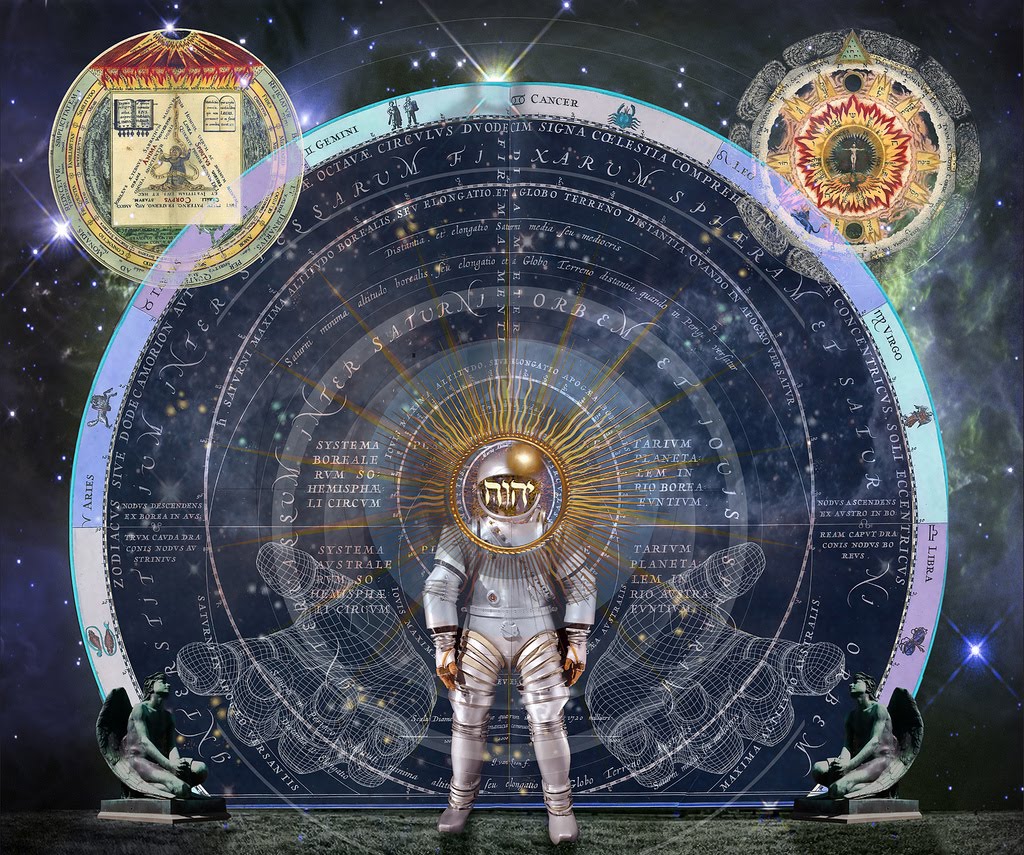

![That Was the Whopper Weekend That Was [Illustrated] welcometohell](https://americandigest.org/wp/wp-content/uploads/2021/05/welcometohell-150x150.jpg)






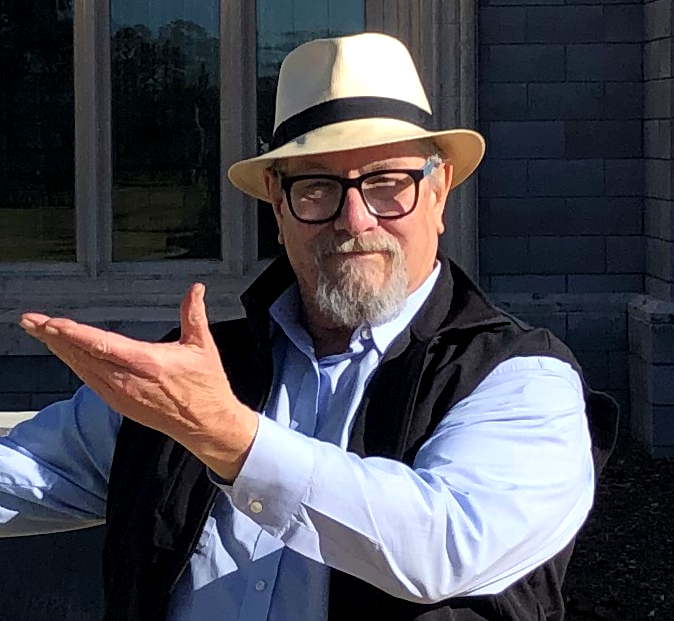 Gerard Van der Leun
Gerard Van der Leun



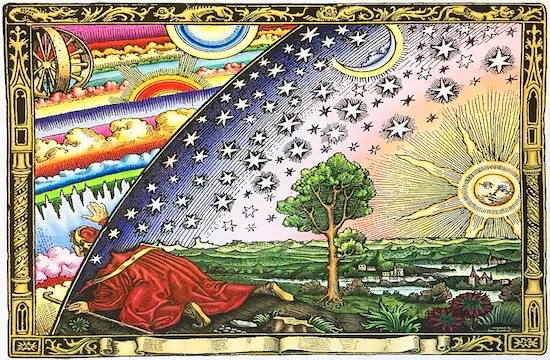


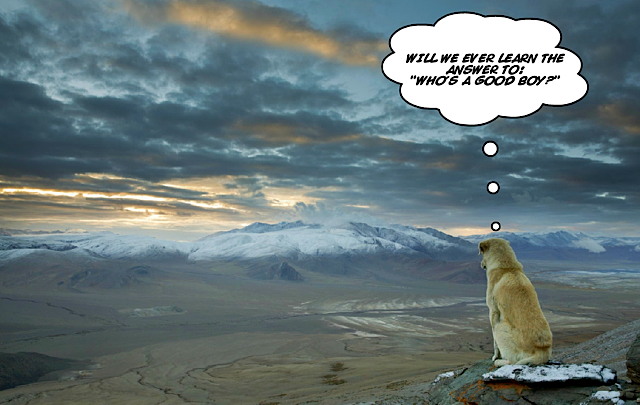



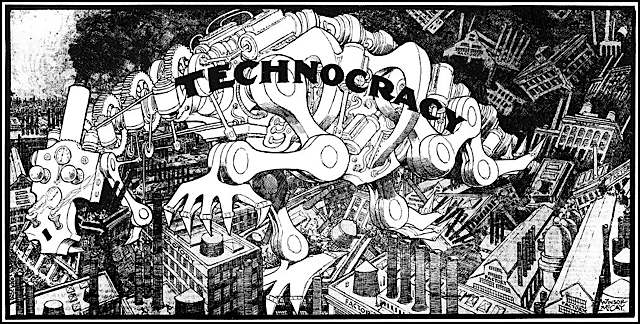

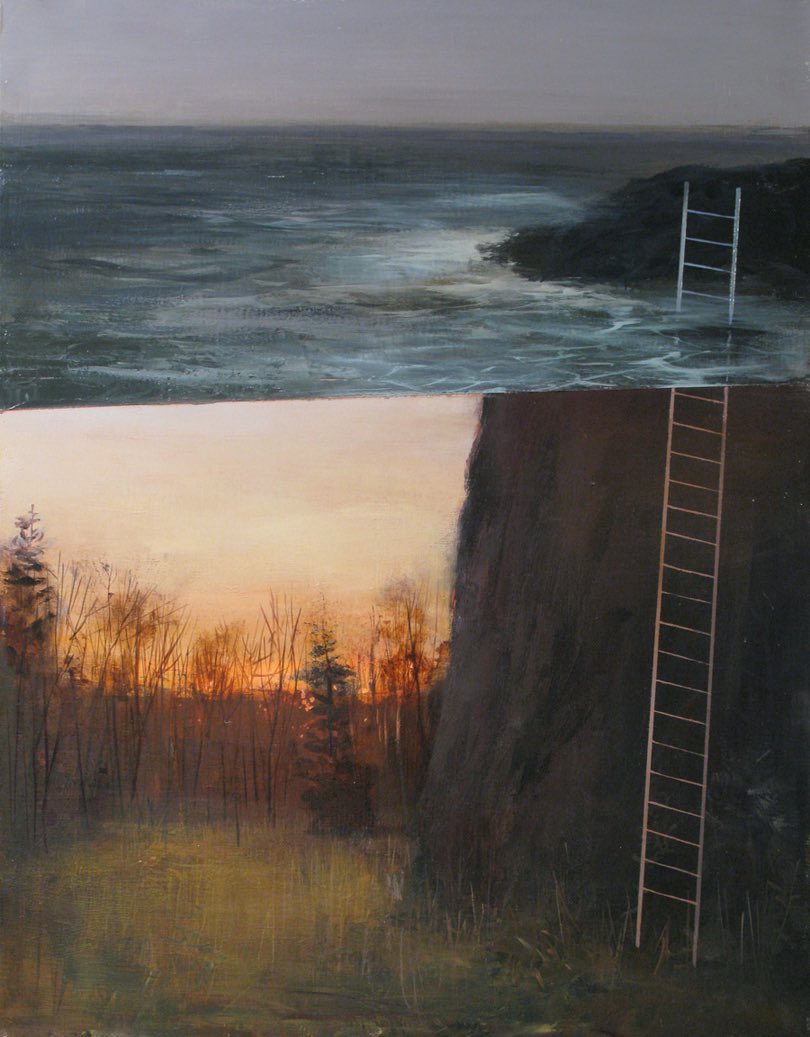


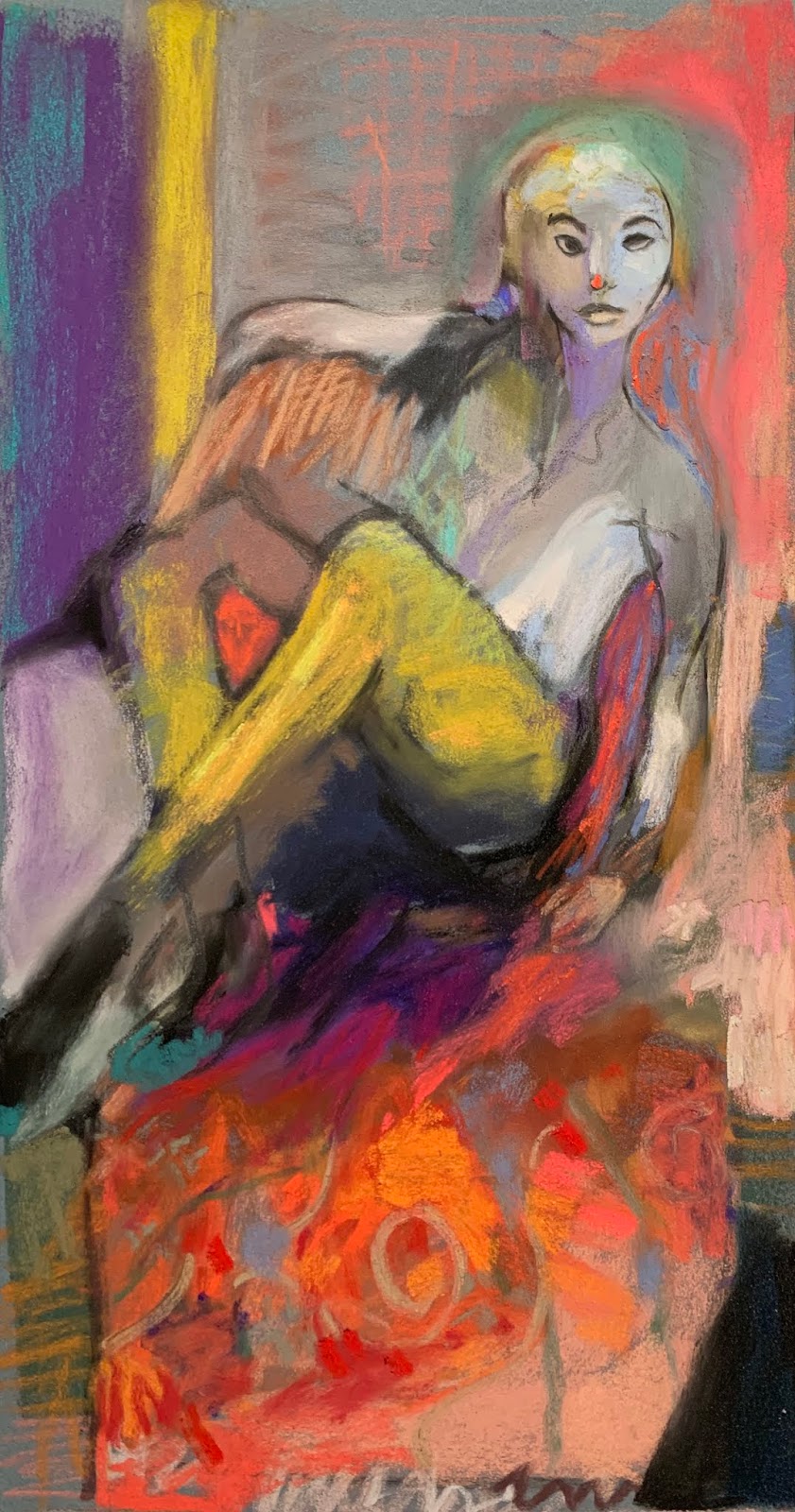
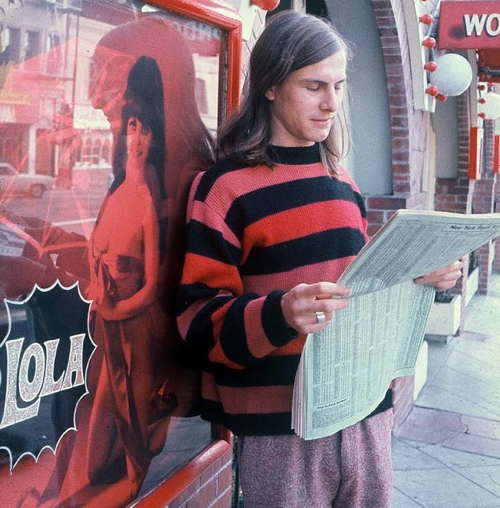




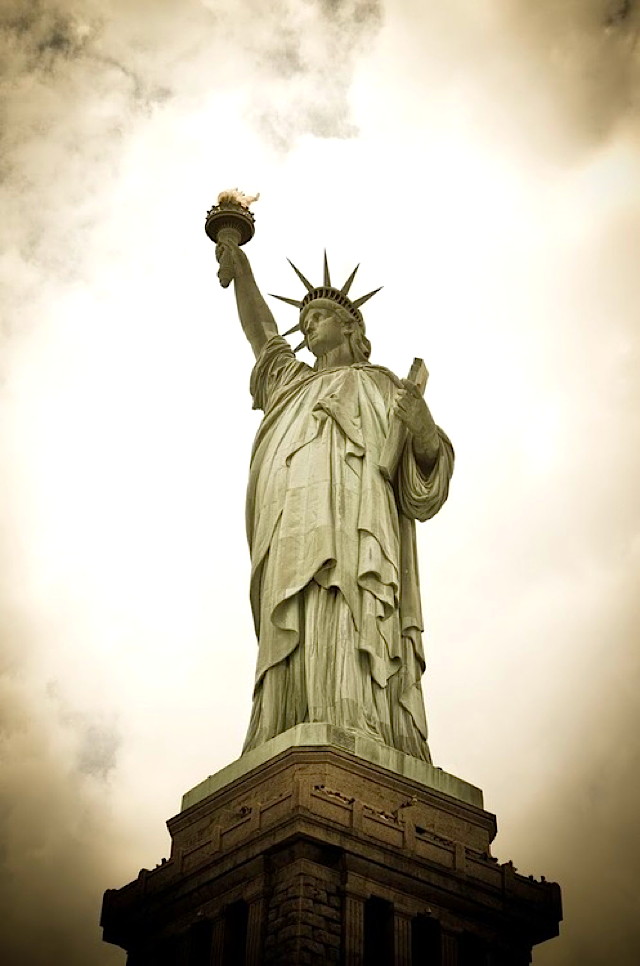


Comments on this entry are closed.
Wow…
I remember reading this years ago, and it’s never left me, as one of the random bits to ponder.
Thank you for bringing it back verbatim.
I must have read this back in the late 50’s maybe early 60’s when I was in high school. For me it is one of the two or three most memorable stories I have ever read.
The New Wave (from England) ended this kind of science fiction and replaced it with endless dystopias.
13 letters in the special alphabet.
Oh, very nice. I remember reading this short story as a young boy, a sci-fi fan even then in the remote hills of east Tennessee. Somehow, the outside world managed to filter in to the hills and hollows of our rural mountain town of 1500. It was nice re-reading this story again, even though I already knew the last line by heart. Thanks for the trip backward in time.
I remember this as one of the stories in a life changing book I enjoyed as a teenager. The book was Science Fiction Hall of Fame, I believe. I still recall some of the other stories in it such as “Marooned off Vesta” and ” The Cold Equations.” A great book, recommended highly. Because of reading these kind of thoughtful stories, with deep thoughts and philisophical ruminations, I could never get interested in the childish popular “science fiction” such as Star Wars…..
Three of Clarke’s books that I read and reread as a teen in the late 1960s and early 1970s will live forever in my brain – The City and the Stars, Childhood’s End, and Tales from the White Hart.
My favorite Frost poem: may be appropriate.
“The Secret Sits”
We dance round in a ring and suppose,
But the Secret sits in the middle and knows.
I have a dim childhood memory of an SF story that had a robot character named “Frost”, and contained a line that read “Out of the depths, I call to thee.”
Not much to go on, but does anyone recognize it? Might have been an allegory to Faust, but not sure. For some reason these fragments of memory have stuck with me for many years!
Re: “Out of the depths, I call to thee.”, Psalm 129 referred to as de profundis. Latin, “De profundis clamavi ad te, Domine”; i.e., “Out of the depths I have cried to thee, O Lord:” To Traditional Catholics, one of the Penitential Psalms.
1Out of the depths I have cried to thee, O Lord:
2 Lord, hear my voice. Let thy ears be attentive to the voice of my supplication.
3 If thou, O Lord, wilt mark iniquities: Lord, who shall stand it.
4 For with Thee there is merciful forgiveness: and by reason of Thy law, I have waited for Thee, O Lord. My soul hath relied on His word:
5 my soul hath hoped in the Lord.
6 From the morning watch even until night, let Israel hope in the Lord.
7 Because with the Lord there is mercy: and with Him plentiful redemption.
8 And He shall redeem Israel from all his iniquities.
I remember that even though it was many decades ago.
I wonder if todays youth would grasp the meaning, the point, or the context.
Sykes:
“The New Wave (from England) ended this kind of science fiction and replaced it with endless dystopias.”
Isn’t the end of everything somewhat dystopic?
I guess it’s not endless though.
I also read this story…oh, I guess, about 65 years ago…I also read the Azimov piece, oh about 62 years ago, where he analyzed the “monkeys with typewriters” problem…really, go find it for yourself…BUT…it does not take just a few years, or a few centuries, or a few millenia…if we had an “automatic typewriter”, that would type out a 60 character line, in…oh, say…1 millisecond…and if we had many such devices… oh, say,…as many as ALL THE PROTONS IN THE UNIVERSE…it would take a VERY long time…Azimov estimated…about 25 billion years…oh, never mind…the editing required…{oh, and… how could you possibly think of all the names of “God” with only nine letters?
Right. “Wonderful Counsellor” is nineteen.
@Ray Van Dune….Is the story you remember “For a Breath I Tarry” by Rodger Zelazny? I’ve never read it, but I work with books & enjoy this sort of challange 🙂 the synopsis sounds like your memory…
I believe this A. C. Clarke story is more pertinent to the season. https://sites.uni.edu/morgans/astro/course/TheStar.pdf
A man heard a Tibetan monk ,who lived in
a cave, had actually seen God. So he travels
to Tibet, climbs a mountain and when
seeing the monk, he asked him to describe
God. “She’s Black”, he replies.
Clarke: hell of a ping pong player
a classick.
for no reason, I’ll leave a short story about a boxer-
https://cdn.theatlantic.com/assets/media/img/posts/hemingway-50-grand.pdf
and a letter written on Christmas Eve by Margaret Paston to her husband in 1459-
Ryght wvrschipful husbond, I recomaund me on-to yov. Plese it yov to wete that I sent yovr eldest svnne to my Lady Morlee to haue knolage qwat sportys were husyd in here hows in Kyrstemesse next folloyng aftyr the deceysse of my lord here husbond. And sche seyd that þere were non dysgysynggys nere harpyng nere lvtyng nere syngyn, nere non lowde dysportys, but pleyng at the tabyllys and schesse and cardys, sweche dysportys sche gave here folkys leve to play, and non odyr.
Yovr svnne dede hese heyrne ryght wele, as ye xal here aftyr þis. I sent yovr yongere svnne to the Lady Stabylton, and sche seyd acordyng to my Lady Morlees seyng in that, and as sche hadde seyn hvsyd in placys of wvrschip þere as sche hathe beyn.
I pray you that ye woll asay to gett sume man at Castere to kepe your botry, for the mane that ye lefte wyth me woll not take vp-on hym to breve dayly as ye commandyt. He seyth he hath not vsyd to geve a rekenyng nothyre of bred nor alle tyll at the wekys end, and he seyth he wot well that he xuld not con don yth; and therfore I soposse he xhall not abyd. And I trowe ye xall be fayne to porveye another man for Symond, for ye hare nevere the nerer a wysse man for hym.
I am sory that ye xall not at hom be for Crystemes. I pray you that ye woll come as sone as ye may. I xhall thynke my-selfe halfe a wedowe because ye xal not be at home, &c. God haue you in hys kepyng. Wretyn on Crystemes Evyn. By your M. P.
-and some Hildegard
O VIRIDISSIMA VIRGA
https://m.youtube.com/watch?v=Gk4d3DQj6C8
I read this yeaaaaaaaaaaaaaaaaaaaaaaaars ago. I’m pretty sure I no longer have the book it was in. Thanks, Gerard.
Ray van Dune:
“For a Breath I Tarry” by Roger Zelazny, 1966.
Full text, no idea about copyright:
http://www.kulichki.com/moshkow/ZELQZNY/forbreat.txt
I read that one in OMNI in my elementary-school library.
Om Mane Padme Hum
The authors of the Golden Age could pack a hell of a punch in not much space. They had to; the market was small, and you had to be pretty good just to get over the transom.
Heinlein once, as a gag, did a short story that would fit on a single magazine page, along with some other artwork and type. It was about a young female piano artist who happened to be blind, and she’s the only survivor of her crashed ship–somewhere on the moon. And of course she can’t tell them where she is, only that she’s sure that she’s on the sunlit side because she can tell the difference between shade and sunlight. So how do they find her? And it has to be fast, as she has little air in her tank.
Heinlein had a way, of course, and he delivered it to the American Library Association in less than 250 words, IIRC, and it was published and he got paid.
Nowadays there are authors that do transcend the “oh God this is so depressing” SF genre. Try Larry Corriea’s Grimnoir series, which starts with Hard Magic. P.A. Piott has his Abner Fortis, ISMC series, starting with Cherry Drop. Peter Grant has both some SF and Old West series; the former starts with Take the Star Road and the westerns begin with Brings the Lightning.
Grant’s stuff is just pleasant reading, not high literature. Piott is a step up, in my opinion. Larry Corriea is damn good, and the Grimnoir series is a lot of fun.
Oh, and I should have mentioned B. V. Larson’s Undying Mercenaries series. It begins with Steel World. The concept is: Earth has purchased from another race machines that can create a new body with all memories if one dies. Thus Earth’s legions are in demand among other races, as mercenaries are Earth’s only real trade good. The protagonist is a big galoot named James McGill, who is smart enough not to show too much of it. He’s also the galaxy’s greatest pussy hound, and the only reason he hasn’t been sentenced to permadeath is that he’s the only human who can talk the aliens out of wiping Earth from the galaxy.